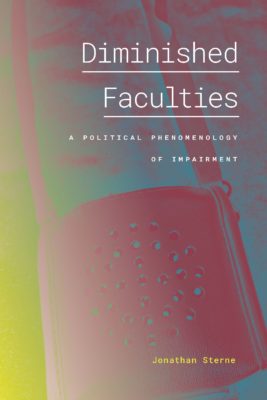One lingering effect of the pandemic has been a heightened awareness of all the ways our bodies fall short in carrying us through life. Millions have shared the debilitating physical experience of fighting off the virus, and many more have felt the subtle breakdown in communication that comes with our new way of living. Struggling to make oneself heard through a mask, forgetting to unmute oneself on a Zoom call, feeling the fatigue of pandemic life’s increased demands – these are all examples of what Jonathan Sterne calls “the experience of resistance of the world to one’s actions.” Far from communicative hiccups, Sterne argues that the experience of living is largely defined by this resistance. Failing to interact perfectly with our environment might actually be our default state.
Sterne, a scholar of media studies at McGill, develops this theory in his latest book, Diminished Faculties: A Political Phenomenology of Impairment. In contrast to the mundane and temporary impairments of pandemic life, Sterne focuses his attention on more significant and long-term impairments, such as difficulty hearing or talking; a supporting pillar of the book is his own experience undergoing throat surgery, which left him with a severely limited ability to speak. But even these experiences, he argues, should be understood as normal and even expected parts of life. Few people will retain perfect hearing throughout their lives, just as the experience of fatigue (another one of Sterne’s main examples) is commonplace, though its causes may vary from person to person. These “normal impairments,” as Sterne calls them, are simply another fact of life: “Isn’t raging against fatigue a little like raging against death?”
Diminished Faculties Duke University Press
A Political Phenomenology of Impairment
Jonathan Sterne
$26.95
paper
304pp
9781478017707
Still, Sterne treats impairment as an even broader category than disability: While the term “disability” has certain policy and legal connotations, impairment is merely a “productive distortion of an ability.” In his conception, there are situations where certain impairments might even be desirable or advantageous.
Sterne’s overarching goal is for his theory of impairment to be useful—that is, he aims to provide a new conceptual framework to explain our own experiences. To this end, one of his key points, which he illustrates by interspersing personal anecdotes throughout the book, is to think of our own narratives as inherently unreliable. This new awareness is meant to be a constructive process, one that creates space for new interpretations by eroding assumptions about our ability to perceive the world as everyone else does. As Sterne writes, “There is no unified we here because the me is only available in multiples.” Yet the idea that there can never be a unified we is also somewhat troubling. Can there be no shared experience that also takes into account these differences in perception? After all, if the experience is as universal as Sterne says it is, there should at least be some hope.mRb






0 Comments